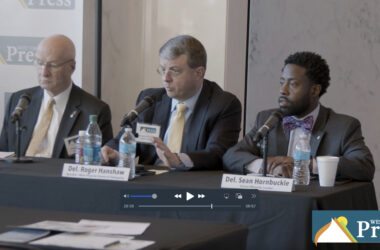CHARLESTON, W.Va. — Doctors Monday spoke against changes to how advanced practice registered nurses are regulated in West Virginia.
Members of the West Virginia Board of Medicine and the West Virginia School of Osteopathic Medicine addressed their concerns to the Legislature’s Government Organization Subcommittee A, which is reviewing a request by APRNs to significantly reduce and change regulations which govern the nurses.
Representatives from the West Virginia Nurses Association Advanced Practice Congress have said removing restrictions and requirements on APRNs, specifically those requiring collaborative agreements with doctors and severely limiting APRNs’ ability to write prescriptions, would improve health care in West Virginia.
The Sunrise Report by the West Virginia Legislative Auditor’s Office Performance Evaluation and Research Division expressed concerns over ending the required collaborative agreements, which the report said “provide an important level of patient protection.”
PERD officials also warned of possible abuse if a large number of nurses were able to write prescriptions for narcotics with little to no direct supervision.
The nurses association has disputed the report’s conclusions.
Nearly every speaker Monday referred to the state PERD report and recommended the Legislature keep in place many of the regulations on APRNs.
“We urge the committee to adopt its findings,” said Robert Knittle, executive director of the West Virginia Board of Medicine. “To do otherwise, I believe, we are reducing the standards of primary care in this state to the standard of nursing care.”
Representatives of the APRNs have said allowing them to operate independently of a doctor and giving them broader prescriptive powers would allow the state to address physician shortages in rural areas. The doctors Monday said medicine in West Virginia and on a national level is moving toward medical teams, clinics and telemedicine to bring services to more rural and underserved areas of the state.
Sherri Young, medical director for the University of Charleston’s PA program and a representative of the West Virginia Academy of Family Physicians, said the level of training for APRNs falls short of the training and experience required of medical doctors.
“What the APRNs are asking to do is (for the Legislature) to give them the same privileges as doctors with much less training,” she said.
Knittle was asked if there was any middle ground to resolve the issue. Knittle said if legislators followed the recommendations of the PERD report, there would be no issue.
“I think if we abide by the current recommendations, that is the middle ground,” he said. “Physicians are physicians. APRNs are APRNs. They are not interchangeable.
Sen. Herb Snyder, D-Jefferson, a co-chairman of the committee, said that would be for the committee to decide.
“It is the purpose of this committee to make sure this doesn’t turn into a multi-year free-for-all,” he said. “I take that task very seriously.”
To read more from the Parkersburg News and Sentinel, subscribe here.





